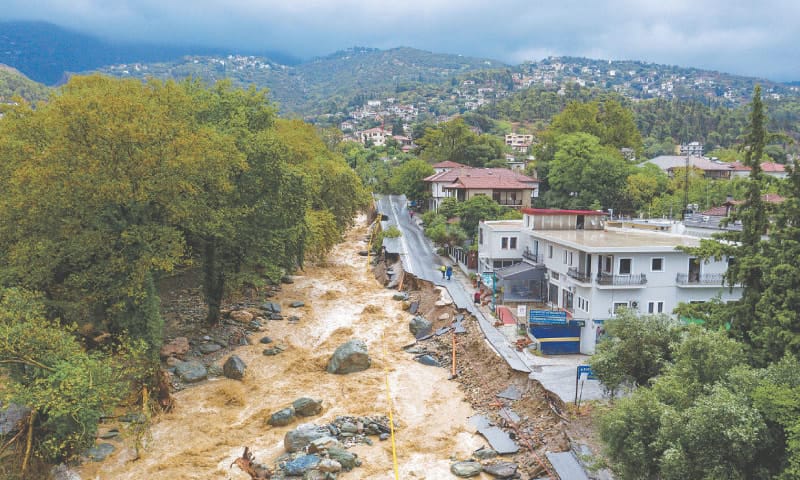In the wake of relentless wildfires that have scorched landscapes and lives, a series of catastrophic storms have left a trail of devastation across Greece, Turkey, and Bulgaria. At least 14 lives have been claimed by the merciless wrath of these storms, which have inundated regions with unprecedented rainfall, creating scenes of chaos and despair. In an era where the world grapples with the consequences of climate change, these events serve as a stark reminder of the challenges humanity faces. Join us as we delve into the harrowing aftermath of these natural disasters.
Greece’s Unprecedented Deluge
Greece, a nation already reeling from weeks of relentless wildfires, found itself in the grip of another disaster as a storm, ominously named “Daniel” by Greek weather experts, unleashed unparalleled rainfall upon the country. In the central Magnesia region, rainfall measuring 600-800 millimeters (24-31 inches) in a mere 24-hour period, including Tuesday, left residents stunned. Dimitris Ziakopoulos, a government meteorologist, described it as an “unprecedented phenomenon” when compared to meteorological records dating back to 1955.
The city of Volos, situated in the heart of the Magnesia region, bore the brunt of Daniel’s fury. Tragically, a 51-year-old man was discovered lifeless near Volos, a grim reminder of the storm’s destructive force. The city has been without electricity since Tuesday morning, while surrounding villages have been ravaged by landslides and severe flooding. As Christos Kleftakis, a resident of Nea Anchialos, poignantly noted, “Everything saved from the fire we had in July has been destroyed by this bad weather.”
The juxtaposition of fires followed by floods paints a dire picture. Greek Prime Minister Kyriakos Mitsotakis called it an “extreme phenomenon,” emphasizing the extraordinary challenges facing the nation. Wildfires that raged for two weeks decimated vast expanses of the Dadia national park in the northern Evros region, though officials now claim the situation is under control.
Turkish City Submerged
In neighboring Turkey, a period of scorching heat gave way to heavy storms, unleashing chaos in the north-western city of Istanbul. This calamity followed an exceptionally dry summer, which saw water reservoirs plummet to nine-year lows in a city inhabited by 16 million people. The Istanbul governor’s office reported two casualties, while Turkish emergency services confirmed five deaths and one missing person in the flood-stricken city of Kirklareli.
The streets of north-western Turkey transformed into torrents, with rising waters engulfing buildings and roads. In a desperate bid to mitigate the devastation, authorities scrambled to respond to the unfolding crisis. As Turkey grapples with the aftermath of these storms, questions arise about the nation’s readiness to handle extreme weather events in an era of climate uncertainty.
Bulgaria’s Black Sea Coast Devastated
The tempestuous rage of these storms was not confined to Greece and Turkey alone. Bulgaria’s Black Sea coast bore the brunt of the heaviest rains it had witnessed in years, leaving a trail of destruction in its wake. At least four lives were claimed by the relentless deluge, and thousands of tourists found themselves stranded amidst the chaos.
Rivers overflowed, bridges were damaged, and access to the region south of Burgas, a coastal city, was severed. Prime Minister Nikolay Denkov lamented the catastrophe, emphasizing the “enormous danger” posed by the region’s steep terrain. The rains, the heaviest since 1994, deposited as much precipitation in 24 hours as the area usually experiences in several months, according to the head of the fire department, Alexandar Dzhartov. The increasing frequency of flooding in the Black Sea coast area is attributed to climate change and the inadequate maintenance of infrastructure.
In conclusion, the deadly storms that have swept across Greece, Turkey, and Bulgaria serve as a chilling reminder of the intensifying impact of climate change. These natural disasters, occurring in quick succession, have left communities grappling with grief, loss, and destruction. As the world contends with a changing climate, these events underscore the pressing need for global action to mitigate the challenges posed by extreme weather phenomena.
















